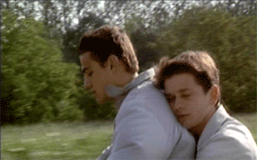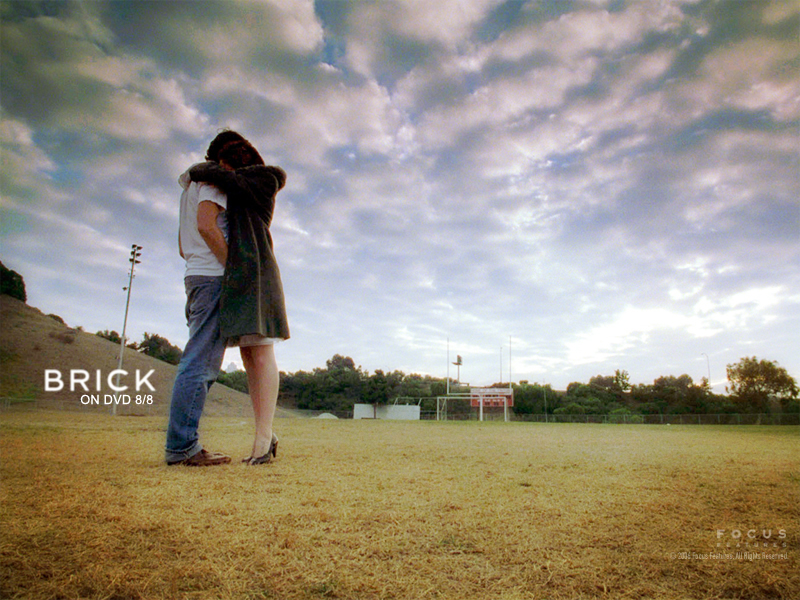 A Single Man
A Single Man is a 2005 film by director Tom Ford. The movie is subtle but brilliant. It follows the life of an English professor in an American university, in the days after he hears the news of his lover's death. His life begins to fall apart as he sinks into grief and lonliness. In the film there are four threads of human contact in his life which run throughout the film.
The first is the relationship he has with a female friend he knew from London. Despite the fact he is gay, she still holds a flame for him and sees his relationship with his dead lover as indulging in perversity and avoiding true love and happiness with her. The second is his relationship with his neighbour, who, with her family and her slightly homophobic husband, seems to represent normal heterosexual America, or what is accepted in terms of life purpose. When the little boy squashes the butterfly while George peeps in from next door, it seemed to address this conflict between "straight" man and "gay" man, in dialect, as we see the pride and aggression of the homophobic father passed on to the son, the father and son both assume to have justifable and purposeful lives. I thought it seemed to allude to the more ephemeral nature of homosexual love, in that it stops at the first generation, squashed like a butterfly, being so much more delicate and fragile than heterosexual love. I thought this was interesting in that his partner's death challenges George's jusitifcation for living.It reminded me of a bit of
Notes of a Desolate Man (荒人手記) by Zhu Tianwen (朱天文):
那斷崖,我稍稍朝下一瞥,魂眩神搖。我站在那裡,感到了也許傅柯也感到的,色情烏托邦。
在那裡,性不必擔負繁殖後代的使命,因此性無需雙方兩造的契約限制,於是性也不必有性別之異。 女女,男男,在撤去所有藩籬的性領域哩,互相探索著性,性的邊際的邊際,可以到哪裡。性遠離了原始的生育功能,昇華到性本身及目的,感官的, 藝術的,美學的,色情國度。這樣,是否就是我們的終極境地?我們這些站人類百分之十屬種渴望到達的夢土?
傅科無語。
我站在那裡,我彷佛看到,人類史上必定出現過許多色情國度罷。它們像奇花異卉,開過就沒了,後世只能從湮滅的荒文裡依稀得知它們存在過。因為它們無法擴大,衍生,在越趨細緻,優柔,色授魂予的哀愁凝結裡,絕種了。
是的,恐怕這就是我們凄艷的命運。
過去的,或是掠逝的,或是要來的,航向拜占庭。
航向色情烏托邦。那些環繞地中海,遠古遠古多如繁星的不知名小國,連神話都沒能傳下來的,終結者。我們是,親屬單位終結者。
From atop the palisade, a brief glance down was enough to make me dizzy. As I stood there, I felt something that maybe Foucault had experienced: erotic utopia.
There, sex would not have to shoulder the mission of procreation, so there would be no contractual demand on either partner, and gender difference would no longer matter. Women with women, men with men, in a sexual realm where all barriers would have been dismantled, exploring sex together and the borders of the borders of sex, as far as they wanted to go. Sex would now be removed from the primitive function of child-bearing, sublimated until sex became its own objective, an erotic nation built upon sensuality, artistry, aesthetics. But was this the ultimate realm for us? Was this the dreamland so earnestly sought by those of us who comprise 10 percent of the human race?
Foucault was silent.
Standing there, I seemed to understand that many erotic nations must have appeared in the course of human history. They were like exotic flowers that disappeared after blooming but once. Later generations could only dimly detect their existence amid vanishing, decaying texts, for they could neither expand nor grow. They became extinct in the frozen sorrows of indetermination and slow degeneration.
I liked the way the mother was portrayed with a certain sympathy and sensitivity, in spite of the sardonic disdain in which he seems to hold her on the surface. This embrace of ephermerality is magnified when as his colleague talks about the threat of the Cold War, George's mind is on the shirtless bodies of students playing tennis.

The nature of experiential living, how one experiences life, is portrayed brilliantly in the film, seemingly pointing to the absurd nature of thinking beyong the bounds of your own life. The third relationship is with a guy he meets outside a drugstore, who offers to sleep with him for money, the scene is not shot in a seedy way however, and after refusing they continue their discussion, talking about life and love.
The most focus is put on the fourth relationship with the student. There's a sexual tension between the two of them that is all the more ideal because it remains unrealized.This was very reminscent of the relationship between Aschenbach and Tadzio in Thomas Mann's
Death in Venice. Through this unrealized sexual relationship, George is saved from suicide.
The film is shot beautifully, and his depression seems visible on screen, as it lifts the brightness increases at moments like when he makes the university secretary smile, or when he stares at Russ in class, when he sniffs some lady's dog and when he observes Carlos's beauty.
I thought that some interesting quotes were as follows:
Of course the Nazis were wrong to hate the Jews but their hating the Jews was not without a cause. It's just that the cause wasn't real. The cause was imagined, the cause was fear... a minority is only thought of as one when it constitutes some kind of threat to the majority, a real threat or an imagined one. And therein lies the fear, but if that minority is somehow invisible then the fear is much greater
Carlos: Es la contaminación lo que le da su color
George: I've never seen the sky like this before.
Carlos: A veces las cosas más horrorosas tiene su punta de encanta
Rating: 5/5
The title quote is taken from Death in Venice by Thomas Mann, the english translation for Notes of a Desolate Man is from Howard Goldblatt's translation.











